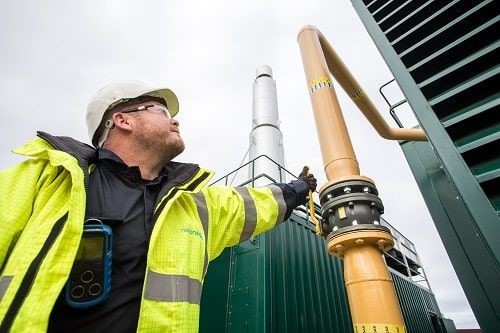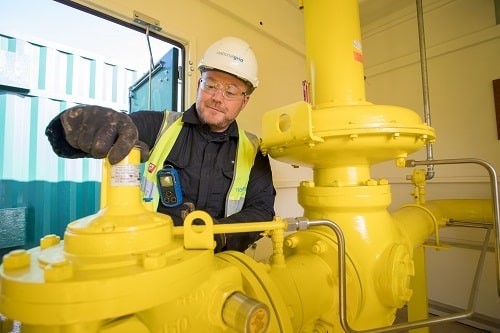National Grid Metering’s gas engineers are empowered to stop work at any point on safety grounds, helping the company achieve a full year without a single lost-time injury.
Features
Putting safety in everyone’s hands
At National Grid Metering (NGM), maintaining the highest safety standards is an organisation-wide responsibility. And this approach has achieved impressive results. With its people empowered to change or halt work, if necessary to stay safe, they have contributed to a full year free from lost-time injuries.
In more precise figures, a total of 1,029,900 hours have been worked, equivalent to 528 full-time employees, without a lost-time injury. And this is largely down to the way NGM trusts its people to make the right decisions when faced with situations that could turn into incidents – even where it means delaying or stopping work.
 In total 1,029,900 hours have been worked, equivalent to 528 full-time employees, without a lost-time injury. Photograph: National Grid Metering
In total 1,029,900 hours have been worked, equivalent to 528 full-time employees, without a lost-time injury. Photograph: National Grid Metering
They don’t need to seek permission, as they are trusted to do the right thing, while the rest of the business focuses on helping overcome the challenge. This is one of the key foundations of NGM’s safety culture.
Of course, these safety-related decisions affect NGM’s customers. No one wants their gas infrastructure project to be delayed, but the teams keep customers involved throughout, so they understand fully the reasons for any hold-ups. Also, because any decisions are made so quickly, the delays are as short as possible. Most importantly, any impact on the progress of projects is much smaller than the consequences of not taking timely action.
Making time for thorough planning
In one example, metering specialist Paul Kundi took the decision to postpone the start of a complex project at the factory of a major food manufacturer. The work involved installing a new main to feed three new gas services, and setting up three new metering modules for different gas feeds to the site.
The safety implications were considerable, and Paul felt that the initial project plan didn’t allow enough time for all precautions to be thoroughly explored and implemented. So he called a halt until a new plan was in place, which would bring no risk of cutting corners or rushing critical operations.
This new plan also enabled the service partner to adopt safer working methods – in particular, to use a vacuum excavator to dig the trench routes needed to install the new outlet pipework and sections of the new gas main.
 The workforce are trusted to make the right decisions when faced with situations that could turn into incidents – even where it means delaying or stopping work. Photograph: National Grid Metering
The workforce are trusted to make the right decisions when faced with situations that could turn into incidents – even where it means delaying or stopping work. Photograph: National Grid Metering
This machine sucks the spoil from the ground using a high-powered vacuum pipe, rather than mechanical digging, and significantly reduces the risk of damaging existing underground plant, such as utility cables and pipework. With this high level of consideration given to precautionary safety planning, Paul’s team were able to begin this major project with confidence.
Ensuring a safe working environment
At the start of a critical maintenance project, metering specialist Mike Simpson stopped work on a site when he spotted materials that could potentially contain asbestos.
This was due to the poor condition of the meter kiosk he was about to work on, and he needed to find out quickly whether it was asbestos. He worked with the site owner to organise an asbestos survey, and then took the decision to isolate the meter from outside the kiosk to keep it safe.
Once the survey had identified the material as harmless, Mike was able to continue with the maintenance. Just this short pause in the work gave peace of mind to Mike, his team and the customer.
Putting safety in writing
Even inadequate safety documentation can be reason enough to postpone work. When Paul Kundi and technical delivery lead, David McRoy, noticed significant gaps in a project’s paperwork, they decided to delay the job rather than forcing the contractors to rush through new documents and risk making potentially dangerous mistakes.
Given more time, the paperwork was completed with all safety factors included, and the project could go ahead with the reassurance that all risks had been properly considered and minimised. This insistence also set a precedent for future projects: no NGM work goes ahead without the correct safety documents.
Phillip Roberts, SHE specialist at NGM, sums up the impact of the organisation’s approach to safety: “These examples, and many more, show how building a culture of trust and responsibility, which lets our people make safety decisions, is preventing injuries, saving time, and maybe even saving lives. At NGM, our people don’t have to ask ‘Can we change or delay this project?’ Instead, they ask, ‘How can we help?’”
Chris Cleveland is Safety, health, environment, assurance, risk and resilience manager at National Grid Metering
FEATURES

Sedentary working and how to combat the ‘sitting disease’
By Gavin Bradley, Active Working on 05 April 2024
Prolonged and excessive sitting poses a major risk to our health, but the Get Britain Standing campaign and On Your Feet Britain Day on 25 April are a great way of encouraging workers to sit less and move more.

Company culture and wellbeing: a crucial link
By Bex Moorhouse, Invigorate Spaces on 05 April 2024
Investing in measures to support worker wellbeing will be ineffective unless the company culture genuinely incorporates values like teamwork, involvement, flexibility and innovation.

Office design and culture: happier and healthier staff – or the opposite?
By Guy Osmond, Osmond Ergonomics on 03 April 2024
Applying ergonomic principles to workstation set-ups and ensuring the physical environment supports neurodivergent people are just some of the ways of creating an office where everyone can thrive, but a supportive and positive organisational culture is vital too.


